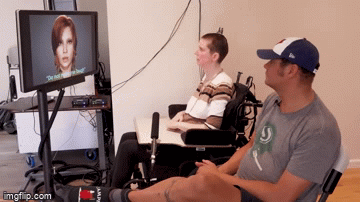Ann Johnson suffered from a stroke in 2005. The then 30-year-old mother was a teacher and a volleyball coach when she lost the ability to speak and walk.
Her mind remained intact. But her words were now trapped behind lips that couldn’t form words.
For the past 18 years, she couldn’t cheer on her players from the sidelines… give presentations… or tell her kids “I love you.”
AI changed that.
Ann received an operation that implanted 253 electrodes into her brain. These electrodes intercept brain signals – specifically, speech and facial expressions.
The signals are transported in real-time to an AI that translates her brain signals into speech and facial expressions on a digital avatar.
The clip below is the first time Ann spoke in over 18 years thanks to help from her digital avatar.
Ann and Her Digital Avatar

Source: UC San Francisco
It’s an understatement to say Ann was overjoyed to speak once again. Her smile says it all.
Researchers used 15 minutes of video from her wedding speech to create her avatar, capturing her mannerisms, speaking style, and inflection.
Doctors, researchers, and AI have given her a voice again. It’s a miracle. But it’s not the only one.
Keith Thomas was left paralyzed from the neck down three years ago. Earlier this month, he received a double neural bypass. The experimental surgery used implants combined with AI to reconnect his brain, body, and spine.
This restored both movement and feeling in his arms – without him having to be tethered to external computers.
The clip below shows Keith moving his arms again with the help of AI.
Keith Can Move His Arms and Feel Again

Source: TIME
Shedding tears of joy, Keith shared, “When I feel the sense of touch, it’s unreal, because I haven’t felt that in three years now. To see an actual family member touch you and feel them is different. It just changed my life.”
Not long ago, most scientists thought a recovery like this was impossible.
Ann and Keith’s miraculous recoveries are giving hope to the over 100 million people globally suffering from some form of paralysis.
The intersection of AI and health is only just starting to be explored. My hope is that one day AI can help people like Ann and Keith regain most – if not all – of their lost mobility.
Because of AI, people who cannot speak, move, or hear are being given new opportunities. I think we are only just beginning to understand the positive effects that AI can have… and the hope developments like these give to millions of people around the world.
Breakthroughs like this are still far from mass commercialization. But even if we’re years away from investing in companies bringing these technologies to the millions in need, these breakthroughs were too important not to share.
A dear friend of mine suffered from a paralyzing stroke similar to Ann’s. I shared these stories with him, and he said it filled him with renewed hope.
If you know anyone who is in a similar situation, consider sharing this with them.
AI isn’t just going to make workers more productive… or grow topline revenue for tech companies. It’s going to restore and improve people’s lives in miraculous ways.
AI is giving those without a voice the ability to speak, and it’s giving movement back to the paralyzed.
This is what I call beauty in innovation.
Regards,
Colin Tedards
Editor, The Bleeding Edge
Like what you’re reading? Send your thoughts to feedback@brownstoneresearch.com.
The Bleeding Edge is the only free newsletter that delivers daily insights and information from the high-tech world as well as topics and trends relevant to investments.
The Bleeding Edge is the only free newsletter that delivers daily insights and information from the high-tech world as well as topics and trends relevant to investments.